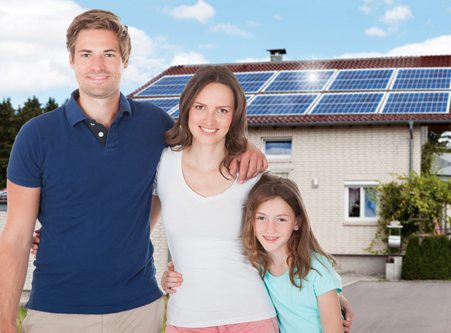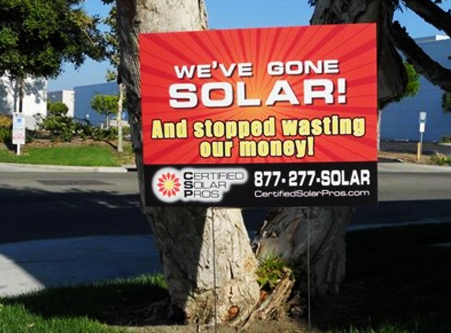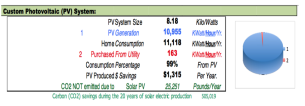By Scott Cooney, CEO of the Important Media Network:
Electrical contractor Dan Sullivan felt the temptation of expanding into the solar market in early 2002. Seeing it as a way to diversify and significantly expand his business, the San Diego based Sullivan answered the siren song and launched Sullivan Solar Power. California is one of the hottest solar markets in the country due to its progressive citizens, coupled with fairly consistent state-wide incentive packages, but marketing solar was no picnic.
“I had to scrape, kick and scream to find my first customer,” Sullivan said. A decade later, Sullivan’s still in business, and still growing, but sales are still a struggle, even now that his business is an established one with a firm reputation. He’s not alone, of course, but customers are actively seeking solar….so where’s the disconnect?
“The residential markets are lagging because of a lack of knowledge by the contractors in how to sell the systems,” says Todd Stafford, senior director of instrumentation, Alternative Energy and International Training Center Operations for National Joint Apprenticeship Training Commitee (NJATC). It’s not the lack of interest from consumers that’s keeping residential solar from going gangbusters, he says, it’s the contractors’ lack of ability to close the sale.
So what’s the secret sauce? How do you succeed in solar? Rest easy. As the media company behind the world’s biggest clean energy website, we’re here to help.
Start By Focusing on The Customer
The first thing to think about regarding marketing, whether it’s solar or bouncy balls, is the customer. Any company that begins marketing by talking about how great they are is making a mistake. It’s always about the customer, not about you. What’s in it for them? How will they benefit from your product?

Marketers will tell you to tailor your offerings to the customer’s primary “pain points”. Hunger is a pain point that helps sell food, for instance. For solar, the main pain points are:
- Utility bills
- Rising costs of fuel
- Jealousy
- Guilt about emissions and global warming
The primary customer point of consideration for many people considering solar is their monthly reminder that they’re paying for every load of laundry they do and for all those lights their kids can’t seem to remember to turn off. According to SolarCity’s Jonathan Bass, however, most people still perceive solar to be expensive, even though solar prices have dropped considerably and the long term financial benefits are very clear.
What do you think these customers’ primary pain points were that pushed them to get solar?
Though I couldn’t find any empirical studies confirming this, many in the solar industry have told me, from experience, that more people seek out solar information within a day or two of receiving their utility bill than at any other time during the month.
Target strategy #1: Commit your advertising to educating the customer about the cost savings inherent in solar. If you know when your local utility sends out bills to customers, you may wish to target those days with geotargeted web-based advertising, or local TV, newspaper, and radio commercials.
The secondary customer pain point, the rising cost of fuel, is notable in that it’s different than the utility bill. This pain point is something that occurs to people over time, not just at the one time per month they write a check to their utility. The difference is that this one builds over time–at some point, the calculator in everyone’s heads starts to urge them to think about their long term financial health. As more news stories are written about the dwindling supplies of fossil fuels and the rising costs of gasoline, people start to understand that the cost of solar, which is fixed every month, is going to be less, in the long run, than continuing down this path.
Target strategy #2: Talk to your customers about the long term costs of unstable fuel supplies. Coal, oil, natural gas, and other fossil fuels come with a diminishing supply and an increasing demand–an economic double whammy resulting in unending price hikes.

The third customer pain point is also one of the 7 Deadly Sins: jealousy. Psychology and Sociology are ironclad and crystal clear on very, very few things, but one thing that seems to be a basic human emotion, regardless of where, when, and who, is that people want to keep up with the Joneses. If someone in the neighborhood gets solar, it’s a symbol of values, self-sufficiency, independence, and pride. It’s a statement. It’s a vote of confidence in solar technology. But it’s also an eye-catching reminder that your neighbor has taken a step to improve their family’s life…and that you haven’t.
Target strategy #3: Tap into the power of community. If you’re on site to do solar in a neighborhood, go talk to the neighbors. Leave flyers. Ask your customer to refer you to their neighbors. Put up signs that say you were there, and that this person trusted you to put solar on their roof. Leave no stone unturned in local marketing.
Your customer’s yard is a chance to let them be proud of going solar, and prime advertising space for you.
The last customer pain point is the one that is an important secondary consideration. Yes, people are concerned about global weirding/warming. Yes, they don’t like the fact that their hard-earned money goes to support big oil, coal, and natural gas companies that have contributed so much pollution and that give so much money to politicians in order to keep renewables down. Yes, they feel guilt that they’re contributing to the destruction of their children’s planet every time they flip on a light switch. But according to research published on Cost of Solar, the environmental benefits of solar are a secondary consideration. A full 74% of solar customers wouldn’t have gotten solar if it didn’t pay for itself. So 26% of the market may be primarily interested in environmental and social justice reasons, but your primary pain points are clearly the financial side of the equation.
Target strategy #4: Fill your quiver with all the right arrows. If you don’t know your customer’s primary interest in solar, ask. If you’re still not sure, or if they’re not giving you a full answer, be prepared to lead with the financial savings, but to pull out the environmental and social benefits at a moment’s prompting.
Know Your Industry
The only thing more important that making “it” all about the customer, is to make sure you know your industry inside and out. Knowledge of the industry, current events, what your competition is doing, and the options you can present to your customer are critical elements of a successful marketing strategy. It’s especially critical if your company does anything other than solar–if you are a general contractor or an electrician that is also offering solar, customers may not view you as an expert and may actually harbor some suspicions that you’re a Johnny Come Lately, even if you’ve been installing solar for a decade or more.
Target strategy #5: Do your homework and know your industry.
- Start by subscribing to CleanTechnica’s solar news feed. (Yes, we own the site, but it is widely recognized as the global leader in clean tech news, so subscribing and reading CleanTechnica daily will keep you on top of your industry, help you be a better communicator to your customers, and keep you a step ahead of the competition).
- Catch CleanTechnica editor Zach Shahan’s CNBC interview.
- Read up on solar industry facts to make sure you know the answer to many of your customers’ potential questions.
- Understand net energy metering (and whether it applies in your area) by checking out the DOE’s website on energy efficiency and renewable energy (EERE ).
- And for Pete’s sake, know the federal, state, and local incentives available to your customers inside and out. The website for that is DSIRE USA.
Differentiation
Solar seems like a commodity product to many potential customers, but there are clearly differences in the quality, durability, and performance of solar panels. I recently had a contractor present me with two options–one for cheaper, less productive panels, and one for SunPower panels that he called, “The Rolls Royce” of solar panels. The difference was clear:

Compared to the other panels that were somewhat cheaper, I would have felt like a cheapskate (and not a very good economist) if I had gone with the others. It’s important to note that not all consumers are going to be able to afford the better system, but give people the option, and those who can afford it will see the clear difference. If your competitors are offering just the cheaper panels, it’ll be clear to the customer who has their best interest in mind in the long haul.
Target strategy #6: Be able to clearly differentiate your products and services. Whether that’s your long term service plan or your brilliant track record, focus on your strengths and be able to handle questions about the areas in which you’re not so strong.
Feed Your Sales Funnel
Many solar companies spend a lot of money on advertising, whereas others spend money trying to get referrals. Revolusun, Hawaii’s biggest residential solar company, gives people $500 if they refer someone to Revolusun who then ends up buying a system. This has sprung a network of young go-getters who patrol their neighborhoods and go door to door recruiting for the company. According to the company, this referral strategy does really well, especially in ethnic and close-knit family neighborhoods, where outsiders (salespeople) are often viewed with skepticism.
Target strategy #7: Nurture your customers and other word-of-mouth disciples. Whether those folks are in it to help the planet or in it for their own financial gain (or both), give them the ammunition they need to help you close your next deal.
The other major way to get leads is to partner with organizations whose business it is to generate those leads for you. Our company uses the online solar savings calculator Cost of Solar for exactly this purpose. If you Google “cost of solar” our website consistently shows up among the top three results, and between that and partnering with CleanTechnica and the rest of the Important Media network, we generate thousands of leads per month of people actively looking for information about going solar at their home. We give people a free report on solar, specific to their lives and homes, and then call them to follow up. Once we verify that they’re for real, we send the leads to solar contractors across the country. One major thing that sets us apart from other solar lead generators? We only give exclusive leads–there’s no bidding war and we’re not selling the lead to more than one contractor.
Target strategy #8: Get in front of interested homeowners–people actively seeking information about putting solar on their roof. Join GridFreedom today to get a steady flow of leads to local homeowners seeking solar.
Co-Market With Strategic Partners
One of the big keys to marketing solar is finding great strategic partners. On the surface, the best strategic partners you may be able to find are other companies in the “green” field that are already saving people money while saving the planet. Think energy auditors and organic food co-operatives. Sure, these businesses will have access to a great, fairly well off demographic that is sustainability minded, and they will have built up a layer of trust that is critical to closing a sale. Getting a referral from these companies would go a long way to finalizing a deal.
According to Tor Valenza, solar blogger extraordinaire, however, some of the best strategic partners may be high on the trust scale and low (or less relevant) on the sustainability scale. Think T-Ball leagues and bowling teams. Sponsor those types of community activities, and the general impression of your business will rise substantially within that community. There are also likely to be less competitors working that space than working the natural foods co-op.
Target strategy #9: Potential customers are everywhere, and solar is a large purchase that requires trust. Build it by making friends where potential customers are…meaning in places you wouldn’t think of first.
Use humor
Let’s be honest. There are a lot of reasons people buy. The feelings of goodwill and warmth toward those that make us laugh is unmistakable however, and there are plenty of marketing studies showing that these feelings do translate into sales. Entertain to captivate. Entertain to build trust.
Target strategy #10: Entertain and engage your customer. They’ll remember you and appreciate you for brightening their day. Here’s an example from a solar company called SunRun: https://www.youtube.com/watch?time_continue=1&v=zYBfAW0fGNc
These ten strategies will help you improve the way you relate to customers and build up more residential solar leads. However, if you want to simplify your marketing process and cut down on your outreach work, partnering with a solar marketing company like Grid Freedom is an effective option.
As a company that provides leads for solar contractors, we allow you to minimize, or even fully eliminate the need for you to generate leads yourself. And because we offer only qualified, 100% exclusive solar leads, every lead you get from us is one with maximum sales potential.